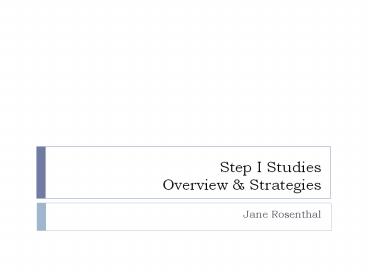Step I Studies Overview - PowerPoint PPT Presentation
Title:
Step I Studies Overview
Description:
Step I Studies Overview & Strategies Jane Rosenthal Don t panic. Have a plan. Stay (Get) organized. USMLE Step 1 Specifications System 25%-35% General principles 65 ... – PowerPoint PPT presentation
Number of Views:147
Avg rating:3.0/5.0
Title: Step I Studies Overview
1
Step I StudiesOverview Strategies
- Jane Rosenthal
2
Dont panic.
3
Have a plan.
4
Stay (Get) organized.
5
- USMLE Step 1 Specifications
- System
- 25-35 General principles
- 65-75 Individual organ systems
- Hematopoietic/Lymphoreticular
Nervous/special senses Skin/connective tissue
Musculoskeletal Respiratory Cardiovascular
Endocrine Immune - Gastrointestinal Renal/urinary
Reproductive - Process
- 20-30 Normal structure and function
- 40-50 Abnormal processes
- 5-25 Principles of therapeutics
- 10-20 Psychosocial, cultural, occupational, and
environmental considerations
Source http//www.usmle.org/General_Information/b
ulletin/2011/content.htmlstep1
6
General Principles
- Biochemistry and Molecular Biology
- Biology of Cells
- Human development Genetics
- Biology of Tissue Response to Disease
- Gender, Ethnic, Behavioral Considerations
Affecting Disease Treatment Prevention - Multisystem Processes
- Pharmacodynamic and Pharmacokinetic Processes
- Microbial Biology Infection
- Immune Responses
- Quantitative Methods
Source http//www.usmle.org/Examinations/step1/20
11Step1.pdf
7
What areas might be challenging for you?
8
Right nowRepro
9
GI/Liver Feb 7 March 11
- Priority 1 Learn the material well!
- To really ramp up for Step 1 review relevant
material from Core integrate with material from
other disciplines
10
Spring break March 12-20
- Develop a study plan based on your strengths
weaknesses - Subscribe to online testing program
(USMLEWorld, Kaplan, etc). - Organize!
- Form a study group
11
Start putting the pieces together.
12
Ideas for ICS
- March 21 Headache
- March 28 Abdominal Pain
- April 4 Fatigue
- 4/4 RSP Presentations
- April11 Dizziness
- April 8 Shortness of Breath
- April 25 Fever
- May 2 Trauma
- 5/9-5/18 OSCE
- May 20 ICS Comprehensive Exam
13
Between May 20th and your test date
- Practice, practice, practice
- Start with more challenging foundational subjects
or systems - Suggest approx 50 questions each day at first,
then increase to 100 per day - Review questions that you miss.
- Check your progress, but dont obsess about it.
- Celebrate improvements.
- 2-3 weeks prior to exam, do a full-length
practice to build endurance and fine-tune your
studying.
14
(No Transcript)
15
Dont let the time slip away.
Remember your goals.
16
What kinds of questions do you expect?
17
Kinds of questions
- Facts, details
- Concepts or functions
- Identifying structures/interpreting images
- Interpreting graphs or diagrams
- Recognizing/understanding signs symptoms
- Using patient history and details
- Determining a diagnosis differential diagnosis
- Understanding test results
- Determining a treatment or management plan
(including next step) - Describing or evaluating outcomes or prognosis
18
More about the test
- How long is it?
- 15 minutes for tutorial (optional)
- 7 sixty-minute blocks (thats 7 hours of
questions!) - Each 60 minute block has 48 questions
- 45 minutes for break
19
More about the test
- How long is it?
- 15 minutes for tutorial (optional)
- 7 sixty-minute blocks (thats 7 hours of
questions!) - Each 60 minute block has 48 questions
- 45 minutes for break
Be sure to build your stamina !
20
During the test
- Take a sweatshirt or sweater the test centers
are often chilly. - There is no penalty for guessing, so always
answer something. - Pace yourself. The screen has a clock to say
time remaining, but wont give you warnings.
Check your progress at regular intervals. 48
questions per hour - 12 questions every15 minutes
21
Some helpful resources
- Utah Pathology Questions
- http//library.med.utah.edu/WebPath/webpath.htmlM
ENU - Student Source (a compilation of resources from a
variety of medical schools for particular topics) - http//www.med-ed.virginia.edu/menu/otherMedEd.cfm
- Content description, sample test and downloadable
program for practice - http//www.usmle.org/Examinations/step1/step1.html
22
FIGHT ON!
Jane Rosenthal Learning Specialist KAM216 janerose
_at_usc.edu (323) 442-2380































